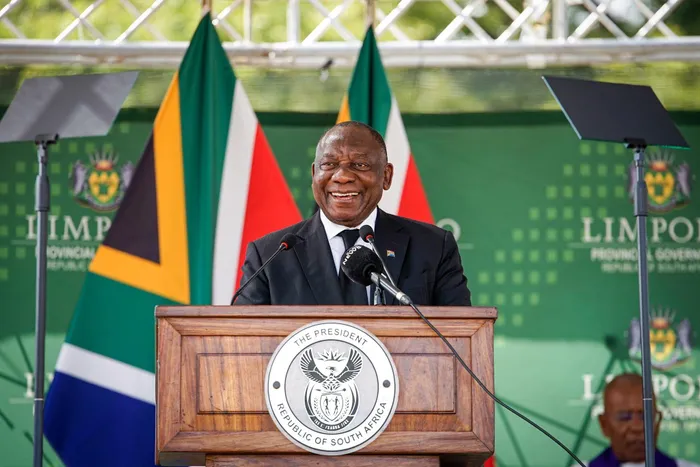
President Cyril Ramaphosa has once again reaffirmed the country's commitment to defending its BBBEE laws as the only way to realise economic inclusion.
Image: ANC/X
South Africa's Broad-based Black Economic Empowerment (BBBEE) policies are here to stay.
These were the words of President Cyril Ramaphosa who once again re-affirmed the country's affirmative action policies as key to economic transformation and inclusion.
This comes as the DA among others have recently voiced their opposition to the country's economic policies.
Ramaphosa and Minister of International Relations, Ronald Lamola during their recent address before the Black Business Council summit, affirmed the current legislative framework.
In his newsletter on Monday, Ramaphosa indicated that the country's economy will not succeed without the current policies, adding that now is not the time to back-track on these policies as they are the cornerstone of economic inclusion and the much-needed economic growth as enshrined in the constitution and the Freedom Charter.
"Our Constitution reflects the promise we made to one another and to future generations to redress the injustices of our past and realise the full potential of our country. For this reason, we reaffirm that broad-based black economic empowerment is not just a policy choice but a constitutional imperative.
"In recent months, the world has entered what many now term a 'poly-crisis' where global conflict, economic stagnation, mistrust in institutions and environmental degradation are challenging even the most resilient of nations."
Ramaphosa said now is not the time to abandon the measures that have been put in place to drive transformation.
"To the contrary, it is the time to move forward with greater purpose and raise our ambition. Since 1994 we have built a robust legislative framework to advance the transformation of our economy, anchored in the Broad-Based Black Economic Empowerment Act and the Employment Equity Act. The progress we have made is undeniable," he said.
In his address to the Black Business Council summit on Thursday, Lamola encouraged black entrepreneurs to take a firm stand in the country's ailing economy.
"In the context of our country, inclusive growth has a broader meaning, it must mean the inclusion of black entrepreneurs in the mainstream of our economy and into the South African business playing a role in the world. This is a constitutional imperative. Further to the above small businesses have a key role to play, exchange program and collaboration becomes key," Lamola said.
Despite the DA saying the BBBEE laws have not worked, Ramaphosa indicated through legislative frameworks such as the BBBEE policies and other interventions, the country has realised and seen real changes in ownership patterns and more businesses owned by women.
"We have seen changes in management control, enterprise development and skills development. According to Statistics SA, between 2006 and 2023, black African households experienced real income growth of 46%, coloured households of 29% and Indian households of 19%.
"Despite this progress, the average income of white households is still nearly five times higher than that of black African households. This is the gulf we must close through deliberate and sustained efforts to expand opportunity. Transformation is not a favour. It is a necessity," he added.
DA deputy spokesperson for International Relations, Ryan Smith said that the current affirmative action policies have not yielded any desirable results for the country's economy.
"The DA deeply understands the crucial importance of economic redress, but policies such as BBBEE have been repeatedly proven to be the wrong legislative vehicle through which to achieve it. The DA’s Economic Justice Policy, which uses poverty as a proxy for disadvantage and not race, ensures that redress and aid are targeted to the citizens who truly need it, instead of further entrenching a system of re-enrichment for the politically connected elite," Smith said.
Cape Times